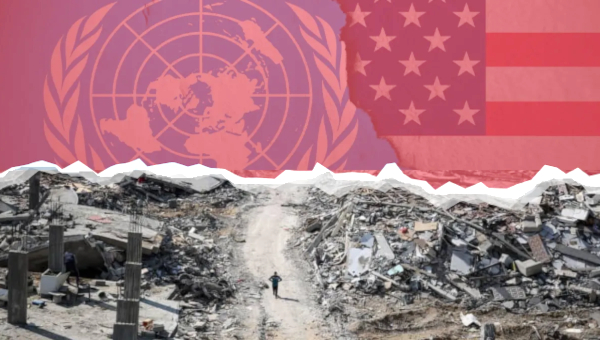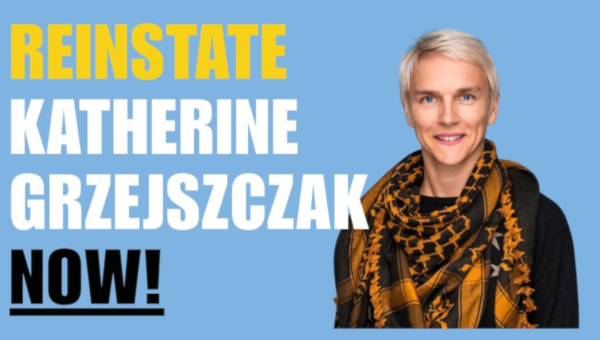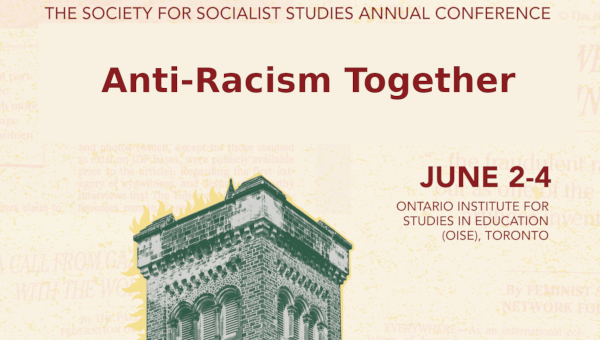Academic Freedom in Canada
Dear Members of the Canadian Association of University Teachers (CAUT) Executive,
We write as a coalition of organizations – the Palestinian Canadian Academics and Artists Network (PCAAN), Faculty for Palestine, (F4P), the Jewish Faculty Network (JFN) and the Coalition Against Antisemitism, Anti-Palestinian Racism and Islamophobia in Canada (CAARI) and the Academic Alliance Against Antisemitism, Racism, Colonialism and Censorship (ARC) – alarmed by the repression of Palestine scholarship and solidarity activities on university campuses. Our organizations include many academics with a direct interest in the Canadian Association of University Teachers (CAUT) and in the protection of academic freedom. Many of our members are also disproportionately impacted by repressive measures to silence scholarship relating to Palestine. We have reviewed both CAUT’s recent “Report on Academic Freedom in Canada after October 7, 2023” as well as the Network of Engaged Canadian Academics (NECA) open letter targeting it. We write to advocate that CAUT take a robust position on academic freedom with respect to Palestine.
We acknowledge and celebrate the exceptional work CAUT has carried out in the past on this issue. CAUT’s 2009 investigation into the Israel lobby’s suppression of a SSHRC supported conference at York University on Palestinian statehood led to the publication of No Debate: The Israel Lobby and Free Speech at Canadian Universities. More recently, CAUT called for the censure of the University of Toronto in 2021, after the law school revoked its job offer to Valentina Azarova, a legal scholar of international repute whose critical work on Palestinian human rights provoked donor interference.

We also recognize the principled stance of CAUT Council which has passed two motions opposing the adoption of the IHRA Working Definition of Antisemitism at Canadian Universities and Colleges, in 2021 and, more recently, in 2024. The IHRA definition conflates criticism of Israel with antisemitism and is thus widely recognized as an egregious impediment to academic freedom and free speech. Numerous faculty associations and provincial federations have also rejected the IHRA.
Given this context, we reject NECA’s open letter concerning CAUT’s Report on Academic Freedom in Canada after October 7, 2023, released to CAUT member associations on April 11, 2025. CAUT’s role as Canada’s foremost advocate for academic freedom on numerous issues, of which Israel-Palestine is only one, is essential in the academic milieu. We view CAUT’s recent report as a first step to documenting the mounting campaign of intimidation against pro-Palestine speech, a campaign that shares many attributes with the outright suppression and criminalization of Palestinian solidarity on US campuses. We strongly encourage CAUT to follow up with a Canada-wide inquiry.
It is our view that CAUT’s work on this issue is buttressed by, and should acknowledge, the framework of international law. Referring to Israel’s unlawful occupation of Palestinian territory indicates that CAUT’s work on these questions is not one of ‘taking sides’ but rather operates alongside the broader human rights architecture on Palestine internationally. Thus, in its introduction we call for CAUT to recognize the larger context surrounding the October 7th Hamas attack, including the ongoing occupation of Palestinian Territory, in violation of international law, as well as the ensuing 18 months of war waged by Israel on Gaza, which the International Court of Justice has acknowledged as plausible genocide. To do so does not condone the Hamas attack but rather acknowledges the context of colonialism and occupation and avoids reductive narrativizations that minimize or erase decades of Palestinian suffering.
We also believe the report, which refers to anti-Palestinian racism (APR) in various locations, should clearly cite the Arab Canadian Lawyers Association report on the term as it is now widely used throughout North America.1 Likewise, where the Palestine Exception to academic freedom is named, we recommend the citation of an important report by that name published by the US organization Palestine Legal in 2015.
Finally, we strongly recommend CAUT reiterate the Association’s clearly established position on the IHRA definition of antisemitism. The report should aptly acknowledge the attempt to suppress research on Palestine via the IHRA definition. One such attempt is exemplified in B’nai B’rith’s Fall 2024 submission to the Parliamentary Standing Committee on Science and Research with relation to its study “The Mission, Mandate, Role, Structure and Financing of the New Capstone Research.” A collective letter submitted by various of the undersigned organizations pointed out the problematic nature of that intervention. The B’nai B’rith intervention shares attributes with the harassment tactics of Canary Mission and Honest Reporting, named in the CAUT report.
With respect to our key recommendation: It is our view that the findings of the report point to the need for a comprehensive, open, and transparent CAUT inquiry into the suppression of speech on Palestine across the country. We know from personal experience, anecdotally, and from existing reports, studies, and academic scholarship, that university faculty, including CAUT members, are being unjustly punished, surveilled, and ostracized; their jobs are being threatened because of their focus on Palestine. We also know of numerous cases of unjust dismissal.2 It is crucial that the repression of scholarship focused on Palestine receive the large-scale and comprehensive investigation it deserves. We must act decisively to protect Canadian higher education from the dynamics unfolding south of the border where the repression of speech on Palestine in the name of combatting antisemitism, an approach rejected and criticized by many scholars, including Jewish scholars, is being employed to undermine principles of critical inquiry and debate central to the university’s mission. We urge CAUT to immediately move forward with such a process.
Sincerely,
Faculty for Palestine (F4P), Palestinian Canadian Academics and Artists Network (PCAAN), Coalition Against Antisemitism, Anti-Arab Racism and Islamophobia (CAAARI), Academic Alliance Against Antisemitism, Racism, Colonialism and Censorship (ARC); Jewish Faculty Network (JFN).
- Palestinian Canadian Academics and Artists Network (PCAAN) is a national and interdisciplinary network providing Canadians access to Palestinian-Canadian academic and artistic voices, expertise, and opinions regarding past and current events related to Palestine, in the context of rising and ubiquitous expressions of anti-Palestinian racism in the Academy and the public sphere.
- Faculty for Palestine (F4P) is a Canada-wide solidarity network of academics committed to advancing the struggle for Palestinian liberation, justice, and equality through the academic sector. The F4P network includes over 600 faculty from universities and colleges across Canada and is a part of the global BDS movement.
- The Coalition Against Antisemitism, Anti-Arab Racism and Islamophobia (CAAARI) is a national coalition of academics and NGOs concerned by anti-Jewish, anti-Muslim and anti-Arab racism and the repression of expressions of solidarity for Palestinians on and off campuses.
- The Academic Alliance Against Antisemitism, Racism, Colonialism and Censorship (ARC) is a nation-wide campaign that organizes to oppose antisemitism, racism, colonialism, and censorship on Canadian university campuses.
- The Jewish Faculty Network is a national network of Jewish academics at Canadian universities who share a strong commitment to social justice in support of an ethical life, whether defined through religious observance or secular action.
Endnotes
- See, for example, Sheryl Nestle & Rowan Gaudet (2022), Unveiling the Chilly Climate: The Suppression of Speech on Palestine in Canada, Independent Jewish Voices; CJPME Foundation (2024), Anti-Palestinian Racism in Canada: 2023 Annual Report; Canadians for Justice and Peace in the Middle East (CJPME), the Arab Canadian Lawyers Association (ACLA), Independent Jewish Voices Canada (IJV), and Canadian Muslim Public Affairs Council (CMPAC) (2024), Combating Anti-Palestinian Racism and Antisemitism: An Intersectional Approach to Canada’s Anti-Racism Strategy.
- See, for example, York University Race Equity Caucus (2024), Surveilled and Silenced: A Report on Palestine Solidarity at York University; CJPME Foundation (2024), Anti-Palestinian Racism in Canada: 2023 Annual Report; Center for Comparative Muslim Studies (Simon Fraser University panel) (2023), Academic Freedom Under Stress: Israel, Palestine, and the Canadian University; Jasmine Zine (2022), The Canadian Islamophobia Industry: Mapping Islamophobia’s Ecosystem in the Great White North; CBC News, Climate of Fear at U of O; CBC News, ‘Chilling effect’: People expressing pro-Palestinian views censured, suspended from work and school (22 December 2023), etc.





